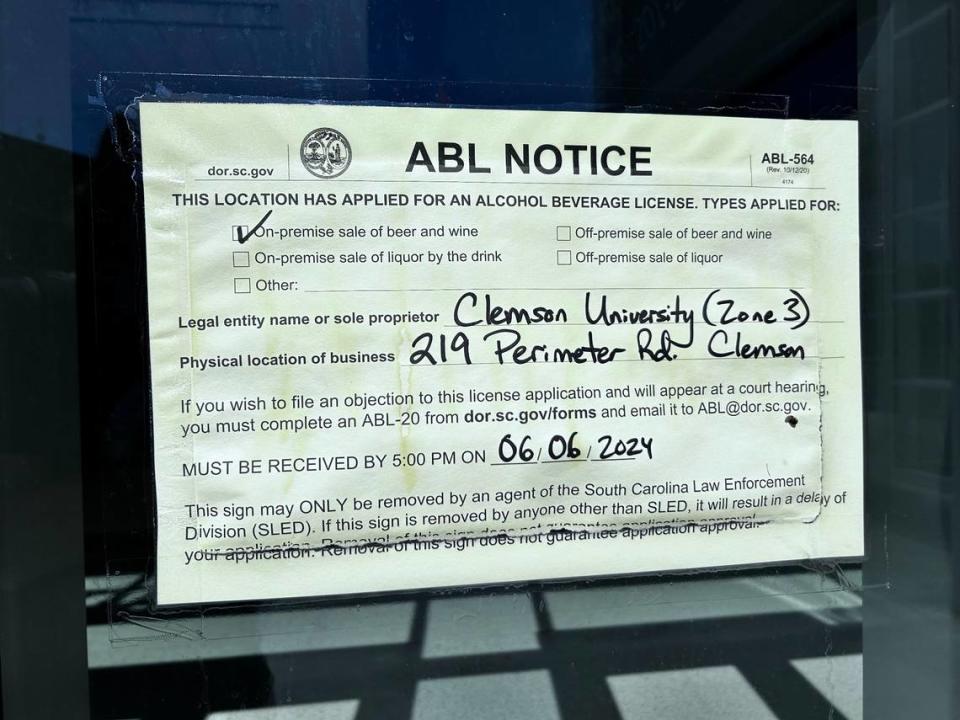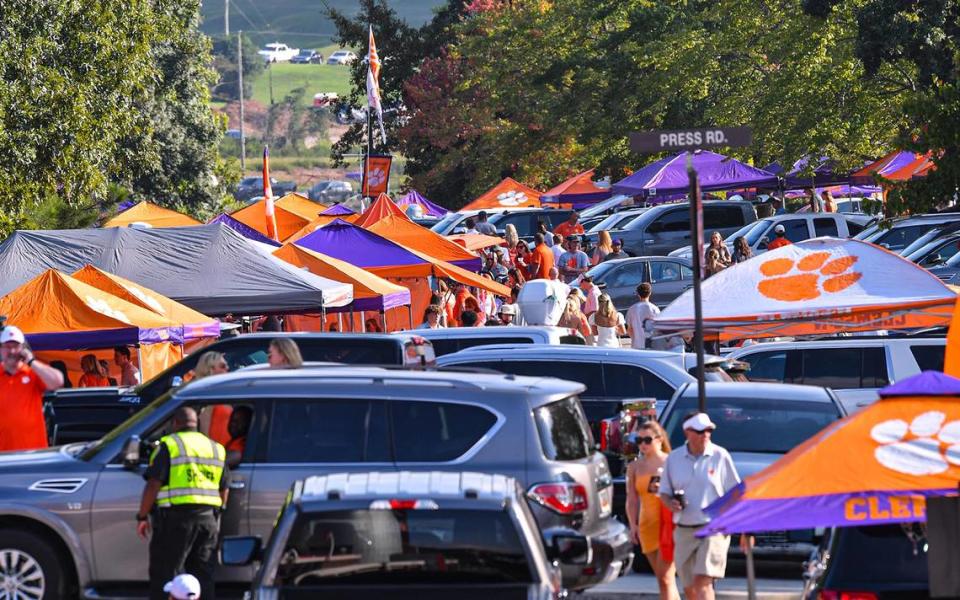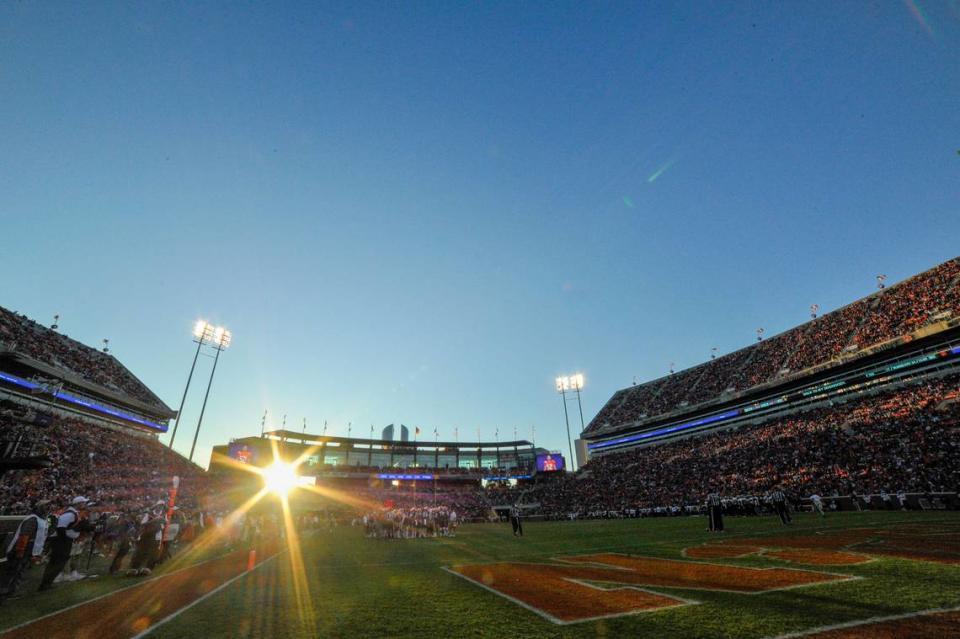Yes, there are currently signs posted outside Clemson’s Memorial Stadium and Littlejohn Coliseum stating the university has applied for on-site beer, wine and liquor licenses at those locations.
But no, that doesn’t mean the school is changing its long-standing policy of not selling alcohol to the general public at football games, basketball games and other sporting events, according to Clemson leaders.
Over the past two weeks, state officials have posted public notices of applications for permanent alcoholic beverage licenses outside Clemson’s two largest and most prominent sporting venues on campus.
According to those notices, Clemson has applied for a permit for on-premise sale of beer and wine at 219 Perimeter Road (the address for Littlejohn Coliseum) and on-premise sale of beer and wine and liquor by the drink at 1 Avenue of Champions (the address for Memorial Stadium).
Those public notices caused some confusion and a bit of a social media tizzy — especially the football stadium’s notice, which was prominently taped to a gate near The Hill, Howard’s Rock and the video board on the east side of the stadium.
On an initial glance, those notices seemed to indicate a massive change to the alcohol policy at Death Valley. But it’s essentially just a continuance of Clemson having beer, wine and liquor present in club and suite areas, school officials said.
According to representatives from Clemson and the state Department of Revenue, these public notices are not an indication that the university is overhauling its alcohol sales policy (no sales to the general public). Instead, officials said, the notices are simply a reflection of Clemson adhering to new state guidance on licensing for all locations that serve and/or store alcohol beverages.
A Clemson athletic department spokesman told The State on Thursday that there are no changes to the school’s alcohol policy for sporting events — and no plans to change it in the immediate future. A university spokesperson also provided the following statement to The State:
“The University, and its contracted vendor Aramark, is required to provide public notice as part of an approval process to request licenses to store alcohol for catering and special events at various locations around campus,” Clemson said. “There are no plans for retail sales of alcohol to individuals at these locations.”
Clemson’s current alcohol policy
Under current university policy, possession of alcoholic beverages is banned for the general public inside Memorial Stadium, Littlejohn Coliseum and other sporting venues. And alcohol, under guidance that dates back decades, is not publicly sold at Clemson sporting events.
The only flexibility within the policy comes for those with premium seating. For suite holders and club guests at football and basketball games, there are designated stocking times (ahead of games) when fans can bring liquor into venues and store it for future consumption, a Clemson athletics spokesman said. Some club/suite areas also include on-site beer and wine service.
For years, Clemson has complied with state law by obtaining temporary special event licenses from the state Department of Revenue’s Alcohol Beverage Licensing office each time they held an event where alcohol was served (as opposed to obtaining a permanent alcohol license).
When an institution such as Clemson applies for a temporary license, it is not required to post a public notice regarding the application, a DOR spokesman told The State via email. The university followed that process for years, clearing the way for alcohol sales and possession in the premium seating areas for football and basketball games in compliance with state law.
Last fall, though, the state Department of Revenue issued new guidance for alcoholic beverage licensing. While Clemson and many other venues statewide chose to obtain temporary licenses on a per-event basis, a spokesman said, the DOR is now encouraging those venues to “apply for permanent alcohol licenses instead of a new special event license for each event.”
One reason for the change: liquor storage laws. A special event license holder can only store liquor on premises “during the period covered by their temporary license,” per the DOR, while permanent license holders have no restrictions for when they can store liquor on site.
“For venues that host events regularly, having a permanent license helps you avoid a situation where you’re storing liquor illegally in between events,” the spokesman said.
New guidance causes confusion
To adhere with new state guidance, Clemson is now going through the process of applying for permanent alcohol licenses at venues where alcohol is, or could be, served on campus.
The requirement that new alcohol license applicants must post public notices outside their premises is not new, according to the DOR. Any institution applying for such licenses must post the ABL-564 notice (the notice posted outside Memorial Stadium and Littlejohn Coliseum) for 15 days. The notice allows for the public to file objections to the application, if they choose.
It’s a routine process and timeline. For Clemson, however, which never had to post these public notices while applying for temporary event licenses, adding the signage at sporting venues and other on-campus locations caused some confusion.
Roughly a month before these notices prompted questions from fans and community members, similar notices for permanent alcohol licenses were placed outside two on-campus dining hall locations, according to The Tiger, Clemson’s student newspaper.
The Tiger reported that permanent alcohol licenses for on-premise sale of beer and wine were posted outside the Douthit Community Hub and Schilletter Dining Hall in mid-April.
A university spokesman later told the newspaper those licenses were not being put in place with the intent of selling alcohol to students on location. Rather, Clemson was following the new DOR guidance and applying so Aramark, the university’s contracted food services provider, could store alcohol in the buildings for its catering events under a permanent license.
Clemson is now going through the same process with some of its sporting venues. (No public notices were spotted outside Doug Kingsmore Stadium, which is hosting an NCAA baseball regional this weekend with the Tigers as the host and top seed.)
Staying ‘family-friendly’
Even as schools across major college athletics have increasingly embraced alcohol sales at sporting events, including in-state rival South Carolina, Clemson has held back on doing so.
According to research from The Associated Press last fall, 55 out of the 69 schools in the then-Power Five (the ACC, SEC, Big Ten, Big 12 and Pac-12 conferences) plus Notre Dame sold alcohol in “public areas” of their football stadiums on game days.
A big part of that sea change was the SEC allowing schools to sell alcohol in 2019. In 2018, only 20 schools permitted public alcohol sales at football games. Since the SEC’s policy change, though, there’s been an “exponential rise,” one expert told the AP.
At South Carolina, the school started selling beer and wine at home football, men’s and women’s basketball and baseball games on Jan. 1, 2020.
The university, according to online Alcohol Beverage Licensing records, currently has active permanent licenses for on-premise beer and wine sales at Williams-Brice Stadium (football), Colonial Life Arena (basketball), Founders Park (baseball) and Carolina Softball Stadium.
South Carolina also has permanent liquor-by-the-drink licenses in place for its football, basketball and baseball venues. Most of the licenses run for about two years and, as part of a regular renewal period, must be renewed by August 2024.
Clemson remains an outlier both in the ACC and major college athletics at large when it comes to alcohol sales. Despite maintaining a robust tailgating atmosphere outside Memorial Stadium, the school has not budged on selling alcohol publicly.
Former athletic director Dan Radakovich emphasized in 2018 that Clemson wants to maintain a “family-friendly” atmosphere at football games, a common goal he said he shared with Dabo Swinney, the school’s decorated football coach.
“Our people in the parking lot have a good time, there’s no question about that,” Radakovich said at the time, per the (Charleston) Post and Courier. “But inside the stadium, I think it’s a little different.”
Graham Neff, Clemson’s current AD, told reporters in 2022 that the school hadn’t had any serious discussions about changing its alcohol policy.
At least one Clemson coach has expressed interest in changing the stance. Tigers baseball coach Erik Bakich brought up his hopes of a policy change unprompted during a postgame interview while he was discussing the Cajun Café, a restaurant/private club area in the right field area at Doug Kingsmore Stadium.
“I always joke, if I ever get ejected, that is where I am going,” Bakich said May 5. “But it’s great. I wish we sold beer. This place would get even more rowdy.”
The State’s Joseph Bustos contributed reporting.


